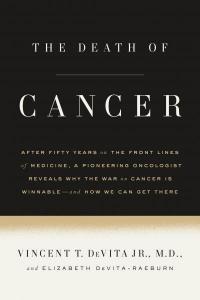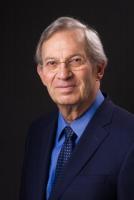DeVita/DeVita-Raeburn: The Death of Cancer
AFTER FIFTY YEARS ON THE FRONT LINES
OF MEDICINE, A PIONEERING ONCOLOGIST REVEALS
WHY THE WAR ON CANCER IS WINNABLE
AND HOW WE CAN GET THERE
Vincent T. DeVita, M.D., and
Elizabeth DeVita-Raeburn (NASW member)
Farrar, Straus and Giroux, November 3, 2015, $28.00
ISBN-10: 0374135606
ISBN-13: 9780374135607
DeVita-Raeburn reports:
This book evolved out of thousands of conversations with my father, former director of the National Cancer Institute, among other titles. He created the first chemotherapy regimen to cure an adult cancer at a time when chemotherapy — particularly combination chemotherapy — was very much disdained by the medical community.
When I was growing up, we lived within a mile of the NCI. Over the course of decades, I heard my father and his colleagues talk about their work and the obstacles they faced — from nonbelievers (doctors who didn’t think cancer could be cured, and thus didn’t really try to cure their patients), to doctors too afraid to use new therapies, to roadblocks posed by the FDA, and dysfunctional cancer centers. When I became a journalist, it dawned on me that these were stories that the public needed to know. My father agreed.Writing the proposal was difficult for all the usual reasons, i.e. synthesizing ideas and organizing them was just hard. A physician friend of my father’s who had written a book recommended his agent. The proposal generated a bidding war. We ultimately went with Sarah Crichton at FSG because she has a reputation for being a hands-on editor. (She’s wonderful.)
It took us a long time to write the book. Some of the reasons were the usual ones: We clung to the original outline for too long. (It didn’t work.) It was hard to keep a regular job going and write. Life tossed a few curveballs our way. I had a second baby less than a year after signing the contract (babies are not conducive to writing on deadline). And my father himself was diagnosed with cancer. His story is in the book.Most people, when they learn that we wrote this together, want to know what it was like. The subtext is, wasn’t it awful, working so closely with a family member? The truth is that, while not every moment was comfortable (ask him about when I cut the manuscript by two-thirds), it was wonderful, and I’m so glad we had the chance to do this together.
Contact info:
- Elizabeth DeVita-Raeburn, 917-749-7964, edr@nyc.rr.com
- Agent: Mark Reiter, 914-841-0168, reiteragency@gmail.com
- Publicists: Sarita Varma, 212-206-5327, sarita.varma@fsgbooks.com; Jill McLaughlin, jill.mclaughlin@fsgbooks.com
NASW members: will your book be published soon? Take advantage of this opportunity for shameless self-promotion. Submit your report for Advance Copy.
Tell your fellow NASW members how you came up with the idea for your book, developed a proposal, found an agent and publisher, funded and conducted research, and put the book together. Include what you wish you had known before you began working on your book, or had done differently.
See https://www.nasw.org/advance-copy-submission-guidelines.
Thinking of writing a book? If you are a NASW member, you may access a list of more than 150 books and online resources to help you craft your book proposal, find an agent and funding sources, negotiate your contract, learn about self-publishing, publicize and market your book, and more at https://www.nasw.org/article/write-book.
Send book info and questions about book publishing to Lynne Lamberg, NASW book editor, llamberg@nasw.org.



